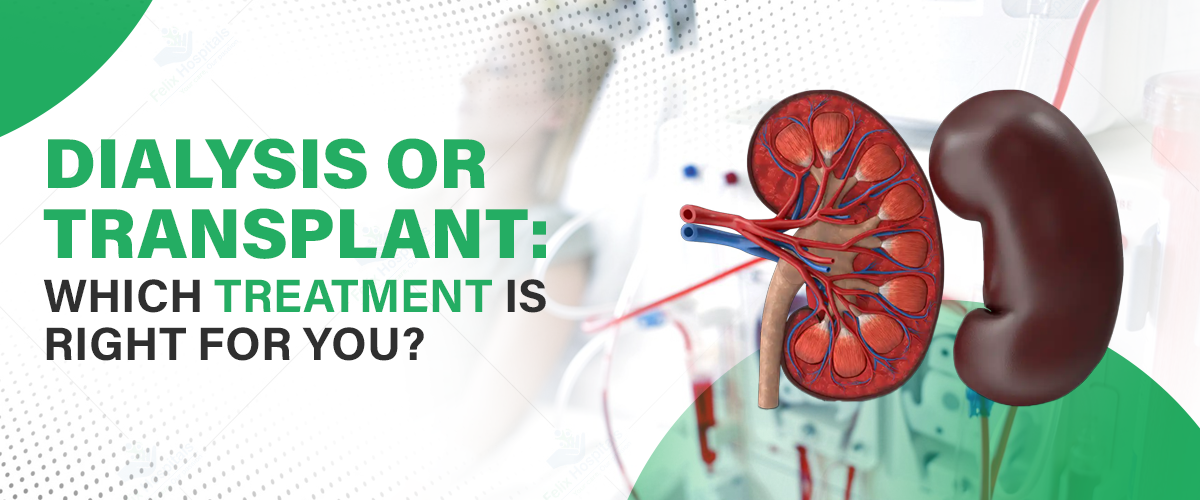
Subscribe to our

Kidney failure is a critical health condition where the kidneys lose their ability to filter waste and maintain the body's balance. Choosing dialysis vs. kidney transplant is a life-altering decision that requires timely and informed consideration. At the best kidney hospital in Noida, patients receive expert guidance to choose these options effectively. This blog aims to clarify the differences, pros, and cons between dialysis vs. kidney transplant to help you make the right choice.
Contact us today by calling +91 9667064100 to consult with our expert nephrologists and explore the best treatment options you need.
Kidney failure occurs when the kidneys can no longer perform their essential functions like filtering toxins and regulating fluids. It leads to severe complications such as high blood pressure, fluid retention, and waste buildup.
Symptoms of Kidney Failure:
Fatigue and shivering
Swelling in the legs
Abnormal urine output
Shortness of breath
Nausea or vomiting
Diagnosis often involves blood tests (creatinine levels, GFR), urine tests, and imaging studies.
Dialysis is a treatment that replicates the kidney's function by removing waste, salt, and excess water.
Hemodialysis: Blood is filtered using a machine.
Peritoneal Dialysis: Waste is removed via a catheter inserted into the abdomen.
Provides an immediate solution for kidney failure.
Requires no complex surgical procedure.
Requires frequent sessions (3–4 times a week for hemodialysis).
Can disrupt daily life and work schedules.
Long-term use may lead to health complications like infections or cardiovascular issues.
A kidney transplant involves replacing a failing kidney with a healthy one from a donor.
1. The Transplant Process:
Matching with a donor (living or deceased).
Undergoing surgery to replace the damaged kidney.
Post-transplant care, including immunosuppressant medications to prevent rejection.
2. Pros of Kidney Transplant:
Offers a better quality of life compared to dialysis.
Frees patients with the need for regular dialysis sessions.
3. Cons of Kidney Transplant:
Long waiting times for a donor's kidney.
Risks associated with surgery and organ rejection.
Lifelong commitment to medications to suppress the immune system.
1. Medical Factors:
The severity of kidney failure, age, and overall health.
Presence of other conditions like diabetes or heart disease.
2. Lifestyle Factors:
Work schedule, travel preferences, and family responsibilities.
Willingness to adapt to treatment routines.
3. Emotional Considerations:
Mental readiness for surgery or regular dialysis.
Concerns about organ rejection or surgical risks.
4. Financial Factors:
Cost comparison: dialysis cost vs. transplant cost.
Insurance coverage and long-term expenses for post-transplant care.
At a reputable kidney failure hospital, specialists help patients weigh these factors to determine the best treatment path.
1. Dialysis:
Advantages: Immediate accessibility, no surgery required.
Challenges: Lifestyle limitations and potential health complications over time.
2. Kidney Transplant:
Advantages: Enhanced quality of life, no dependency on dialysis machines.
Challenges: Finding a donor, surgery risks, and lifelong medication requirements.
At Felix Hospitals, we have a dedicated team of nephrologists with the best expertise in dialysis treatment and kidney care. Meet our expert doctors:
Dr. Sameer Tawakley: With a wealth of experience in managing complex kidney conditions, Dr. Tawakley specializes in providing the perfect dialysis treatment plans to enhance kidney function and overall health.
Dr. Anuj Jaiswal: Known for his expertise in kidney disease prevention and early detection, Dr. Jaiswal works closely with patients to manage dialysis effectively and improve long-term kidney health outcomes.
Together, these experts deliver the perfect dialysis care, helping patients maintain kidney function and lead healthier, more fulfilling lives.
Facing kidney failure and unsure about dialysis or a transplant? Book an appointment with our experienced team at Felix Hospitals.
Choosing between dialysis vs. kidney transplant is a significant decision that depends on medical, lifestyle, and emotional factors. Both options have unique advantages and challenges, but timely action and expert guidance can lead to better outcomes.
At the best hospital in Noida, you’ll find personalized care tailored to your needs. Whether you opt for dialysis or transplant, early intervention, and proactive healthcare are key to improving your quality of life. Take charge of your kidney health today!
1. What factors should I consider when deciding between dialysis and a kidney transplant?
Ans: The decision depends on various factors, including the severity of kidney failure, your overall health, lifestyle preferences, emotional readiness, and the potential risks of surgery. Consulting with a nephrologist can help you evaluate your situation.
2. How long does it typically take to receive a kidney transplant after being placed on the waiting list?
Ans: The waiting time for a kidney transplant can vary widely, depending on factors like blood type, the availability of suitable donors, and your health condition. On average, the wait can range from several months to years.
3. Can I continue my regular activities while undergoing dialysis?
Ans: Dialysis may disrupt your routine since it requires frequent sessions. However, many patients adapt by scheduling sessions around their work and personal commitments. Your healthcare team can help you manage treatment while maintaining a balanced lifestyle.
4. What are the chances of organ rejection after a kidney transplant?
Ans: While organ rejection is possible, it can be minimized with proper immunosuppressive medications. Regular monitoring and follow-up care are essential to detect and address rejection early.
5. Is kidney transplant surgery risky?
Ans: Kidney transplant surgery carries inherent risks, including complications from anesthesia, infection, and organ rejection. However, with modern medical advances, the procedure is generally safe, and doctors take extensive precautions to minimize risks.
6. How often do I need to visit the doctor after a kidney transplant?
Ans: Post-transplant care involves frequent check-ups, especially in the first year. Regular visits are crucial to monitor kidney function, manage medications, and address any potential complications, such as infection or rejection.
7. What are the long-term health considerations after a kidney transplant?
Ans: Long-term considerations include managing immunosuppressant medications to prevent rejection, monitoring for infections, and ensuring the new kidney remains healthy. Lifestyle changes, including a balanced diet and regular exercise, also play a key role in maintaining good health.